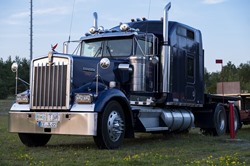How to Choose the Best CDL Driving Classes near Tar Heel North Carolina
 Congratulations on your decision to become a trucker and enroll in a CDL school near Tar Heel NC. Maybe it has always been your fantasy to hit the open highway while operating a big ole tractor trailer. Or perhaps you have conducted some analysis and have discovered that a career as a truck driver provides good wages and flexible work prospects. No matter what your reason is, it’s imperative to receive the appropriate training by choosing the right CDL school in your area. When assessing your options, there are certain variables that you’ll want to consider before making your ultimate choice. Location will no doubt be important, particularly if you have to commute from your Tar Heel home. The expense will also be of importance, but picking a school based exclusively on price is not the optimal means to make certain you’ll receive the proper education. Just remember, your goal is to learn the skills and knowledge that will allow you to pass the CDL examinations and become a professional truck driver. So keeping that purpose in mind, just how do you pick a truck driving school? The answer to that question is what we are going to address in the remainder of this article. But first, we are going to review a little bit about which commercial driver’s license you will ultimately need.
Congratulations on your decision to become a trucker and enroll in a CDL school near Tar Heel NC. Maybe it has always been your fantasy to hit the open highway while operating a big ole tractor trailer. Or perhaps you have conducted some analysis and have discovered that a career as a truck driver provides good wages and flexible work prospects. No matter what your reason is, it’s imperative to receive the appropriate training by choosing the right CDL school in your area. When assessing your options, there are certain variables that you’ll want to consider before making your ultimate choice. Location will no doubt be important, particularly if you have to commute from your Tar Heel home. The expense will also be of importance, but picking a school based exclusively on price is not the optimal means to make certain you’ll receive the proper education. Just remember, your goal is to learn the skills and knowledge that will allow you to pass the CDL examinations and become a professional truck driver. So keeping that purpose in mind, just how do you pick a truck driving school? The answer to that question is what we are going to address in the remainder of this article. But first, we are going to review a little bit about which commercial driver’s license you will ultimately need.
Which CDL Should You Get?
 To operate commercial vehicles lawfully within the United States and Tar Heel NC, a driver must get a CDL (Commercial Driver’s License). The 3 license classes that one can apply for are Class A, Class B and Class C. Since the topic of this article is how to select a truck driving school, we will address Class A and B licenses. What distinguishes each class of CDL is the kind of vehicle that the driver can operate together with the GVWR (Gross Vehicle Weight Rating) or GCWR (Gross Combination Weight Rating). Below are short explanations of the 2 classes.
To operate commercial vehicles lawfully within the United States and Tar Heel NC, a driver must get a CDL (Commercial Driver’s License). The 3 license classes that one can apply for are Class A, Class B and Class C. Since the topic of this article is how to select a truck driving school, we will address Class A and B licenses. What distinguishes each class of CDL is the kind of vehicle that the driver can operate together with the GVWR (Gross Vehicle Weight Rating) or GCWR (Gross Combination Weight Rating). Below are short explanations of the 2 classes.
Class A CDL. A Class A CDL is required to operate any vehicle that has a GCWR of greater than 26,000 lbs., including a towed vehicle of more than 10,000 lbs. A few of the vehicles that operators may be able to drive with Class A licenses are:
- Interstate or Intrastate Tractor Trailers
- Trucks with Double or Triple Trailers
- Tanker Trucks
- Livestock Carriers
- Class B and Class C Vehicles
Class B CDL. A Class B CDL is needed to operate single vehicles having a GVWR of greater than 26,000 lbs., or a GCWR of greater than 26,000 lbs. including a towed vehicle weighing up to 10,000 lbs. Some of the vehicles that operators may be qualified to drive with Class B licenses are:
- Tractor Trailers
- Dump Trucks
- Cement Mixers
- Large Buses
- Class C Vehicles
Both Class A and Class B CDLs might also require endorsements to drive certain kinds of vehicles, such as passenger or school buses. And a Class A licensee, with the appropriate required endorsements, can drive any vehicle that a Class B license holder is qualified to drive.
Click Here to Get Free Information on Truck Driving Schools Near You!
How to Evaluate a Truck Driving School
 Once you have determined which Commercial Drivers License you would like to obtain, you can start the process of assessing the Tar Heel NC truck driving schools that you are considering. As already mentioned, cost and location will certainly be your primary concerns. But it can’t be stressed enough that they should not be your only considerations. Other factors, for example the reputations of the schools or the experience of the instructors are equally if not more important. So following are some more things that you should research while performing your due diligence before selecting, and particularly paying for, your truck driver training.
Once you have determined which Commercial Drivers License you would like to obtain, you can start the process of assessing the Tar Heel NC truck driving schools that you are considering. As already mentioned, cost and location will certainly be your primary concerns. But it can’t be stressed enough that they should not be your only considerations. Other factors, for example the reputations of the schools or the experience of the instructors are equally if not more important. So following are some more things that you should research while performing your due diligence before selecting, and particularly paying for, your truck driver training.
Are the Schools Accredited or Certified ? Not many trucking schools in the Tar Heel NC area are accredited because of the rigorous process and cost to the schools. On the other hand, certification is more common and is offered by the Professional Truck Driver Institute (PTDI). A school is not obligated to become certified, but there are certain advantages. Interested students recognize that the training will be of the highest standard, and that they will get plenty of driving time. For example, PTDI calls for 44 hours of actual driving time, not ride-alongs or simulations. So if a school’s course is certified (the course, not the school is certified), students know that the training and curriculum will meet the very high benchmarks set by PTDI.
How Long in Business? One clue to help evaluate the quality of a truck driving school is how long it has been in business. A negatively ranked or a fly by night school usually will not be in business very long, so longevity is a plus. Having said that, even the best of Tar Heel NC schools had to begin from their first day of training, so consider it as one of multiple qualifiers. You can also find out what the school’s track record is relating to successful licensing and job placement of its graduating students. If a school won’t supply those numbers, search elsewhere. The schools should also maintain associations with local and national trucking firms. Having a large number of contacts not only affirms a superior reputation within the industry, but also bolsters their job assistance program for graduates. It also wouldn’t hurt to contact the North Carolina licensing authority to make sure that the CDL trucking schools you are researching are in compliance.
How Effective is the Training? As a minimum requirement, the schools should be licensed in North Carolina and employ instructors that are trained and experienced. We will talk more about the instructors in the next segment. In addition, the student to instructor proportion should not be higher than 4 to 1. If it’s any greater, then students will not be obtaining the personalized attention they will need. This is particularly true concerning the one-on-one instruction for behind the wheel training. And watch out for any school that professes it can train you to drive trucks in a comparatively short period of time. Training to be a truck driver and to drive a tractor trailer professionally requires time. The majority of Tar Heel NC schools provide training courses that range from 3 weeks to as long as two months, based on the class of license or type of vehicle.
How Good are the Trainers? As already stated, it’s essential that the instructors are trained to teach driving techniques and experienced as both drivers and instructors. Even though a number of states have minimum driving time prerequisites to be certified as an instructor, the more professional driving experience an instructor has the better. It’s also vital that the teachers stay current with industry advancements or any new regulations or changes in existing laws. Evaluating instructors might be a bit more intuitive than other standards, and perhaps the best method is to pay a visit to the school and talk to the teachers in person. You can also talk to some of the students completing the training and ask if they are happy with the quality of instruction and the teacher’s qualification to train them.
Adequate Driving Time? Most importantly, an excellent truck driving school will provide sufficient driving time to its students. After all, isn’t that what it’s all about? Driving time is the real time spent behind the wheel driving a truck. While the use of ride-a-longs with other students and simulators are necessary training methods, they are no alternative for real driving. The more instruction that a student receives behind the wheel, the better driver he or she will become. Although driving time can vary between schools, a good benchmark is 32 hours at a minimum. If the school is PTDI certified, it will furnish a minimum of 44 hours of driving time. Get in touch with the Tar Heel NC schools you are researching and ask how much driving time they furnish.
Are they Captive or Independent ? It’s possible to obtain discounted or even free training from a number of truck driver schools if you enter into an agreement to drive for a specific carrier for a defined period of time. This is referred to as contract training, and the schools that offer it are called captives. So rather than maintaining associations with a wide range of trucking lines that they can place their graduates with, captives only work with one company. The benefit is receiving free or less expensive training by giving up the flexibility to initially be a driver wherever you choose. Naturally contract training has the potential to limit your income opportunities when starting out. But for many it may be the best way to obtain affordable training. Just be sure to find out if the Tar Heel NC schools you are considering are captive or independent so that you can make an informed decision.
Offer Onsite CDL Testing? There are a number of states that will permit 3rd party CDL testing onsite of truck driving schools for its grads. If onsite testing is permitted in North Carolina, find out if the schools you are looking at are DMV certified to offer it. One benefit is that it is more convenient than contending with graduates from competing schools for test times at North Carolina testing locations. It is moreover an indication that the DMV views the approved schools to be of a higher quality.
Are the Class Times Convenient? As previously noted, truck driving training is just one to two months in length. With such a short duration, it’s imperative that the Tar Heel NC school you select provides flexibility for both the scheduling of classes and the curriculum. For example, if you’re having difficulty learning a particular driving maneuver, then the teacher should be prepared to devote more time with you until you are proficient. And if you’re still holding a job while attending training, then the class scheduling needs to be flexible enough to accommodate working hours or other responsibilities.
Is Job Assistance Provided? The moment you have received your commercial driver’s license after graduating from truck driving school, you will be keen to start your new career. Confirm that the schools you are looking at have job placement programs. Find out what their job placement rate is and what average salary their grads start at. Also, ask which national and local trucking companies their graduates are placed with for hiring. If a school has a lower job placement rate or not many Tar Heel NC employers recruiting their grads, it might be a clue to search elsewhere.
Is Financial Aid Available? Truck driver schools are similar to colleges and other Tar Heel NC area technical or vocational schools when it comes to loans and other forms of financial assistance being available. Ask if the schools you are assessing have a financial assistance department, or at least someone who can help you understand the options and forms that need to be completed.
Commercial Truck Driving Schools Tar Heel North Carolina
 Picking the appropriate trucking school is an important first step to beginning your new profession as a local or long distance truck driver. The skill sets that you will learn at school will be those that mold a new career behind the wheel. There are a number of options offered and understanding them is vital to a new driver’s success. You originally came to our website because of your interest in Commercial Truck Driving Schools and wanting information on the topic Dump Truck Training. But first and foremost, you must receive the appropriate training in order to drive a large commercial vehicle in a safe and professional fashion. If you are short on cash or financing, you might want to look into a captive school. You will pay a reduced or in some cases no tuition in exchange for driving for their contracted carrier. Or you can choose an independent trucker school and have the the freedom to drive for the trucking firm of your choosing, or one of several associated with the school. It’s your decision. But no matter how you obtain your training, you will in the near future be joining an industry that helps our country move as a professional truck driver in Tar Heel NC.
Picking the appropriate trucking school is an important first step to beginning your new profession as a local or long distance truck driver. The skill sets that you will learn at school will be those that mold a new career behind the wheel. There are a number of options offered and understanding them is vital to a new driver’s success. You originally came to our website because of your interest in Commercial Truck Driving Schools and wanting information on the topic Dump Truck Training. But first and foremost, you must receive the appropriate training in order to drive a large commercial vehicle in a safe and professional fashion. If you are short on cash or financing, you might want to look into a captive school. You will pay a reduced or in some cases no tuition in exchange for driving for their contracted carrier. Or you can choose an independent trucker school and have the the freedom to drive for the trucking firm of your choosing, or one of several associated with the school. It’s your decision. But no matter how you obtain your training, you will in the near future be joining an industry that helps our country move as a professional truck driver in Tar Heel NC.
Truck On in These Other North Carolina Locations
Tar Heel
The exact etymology of the nickname is unknown, but most folklore believe its roots come from the fact that tar, pitch, and turpentine created from the vast pine forests that were some of North Carolina's most important exports early in the state's history. It also finds loose associations to the period’s group of bare knuckle fighters who brawled using the famed tar pits of the area as their battle ground. For a time after the American Civil War, the name Tar Heel was originally derogatory, but it was later reappropriated by the people of North Carolina.[1] Because the exact history of the term is unknown, a number of legends have developed to explain it. One such legend claims it to be a nickname given during the U.S. Civil War, because of the state's importance on the Confederate side, and the fact that the troops "stuck to their ranks like they had tar on their heels".[2] The term "Tar Heel" gained popularity during the Civil War.[3]
In its early years as a colony, North Carolina settlements became an important source of the naval stores of tar, pitch, and turpentine, especially for the British navy. Tar and pitch were largely used to paint the bottom of wooden British ships both to seal the ship and to prevent shipworms from damaging the hull.[4]
At one time, an estimated 100,000 barrels (16,000 m3) of tar and pitch were shipped annually to England.[1] After 1824, North Carolina became the leader in the United States for naval stores.[5] By the Civil War, North Carolina had more than 1600 turpentine distilleries, and two thirds of all turpentine in the United States came from North Carolina and one-half from the counties of Bladen and New Hanover.[5]
Business Results 1 - 10 of 4


